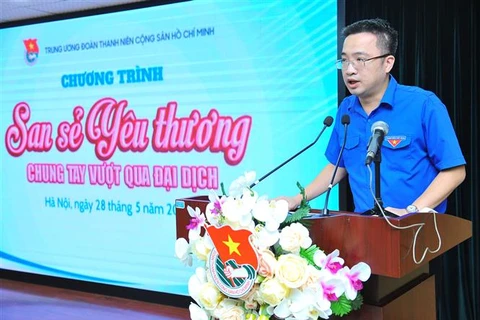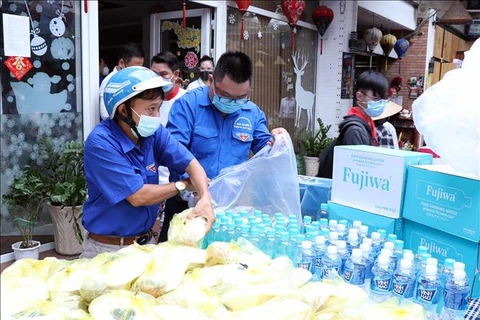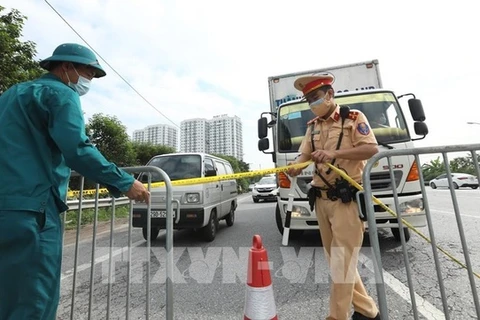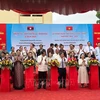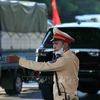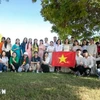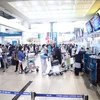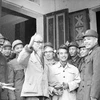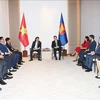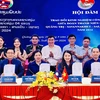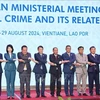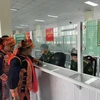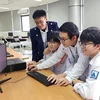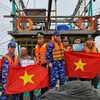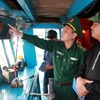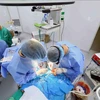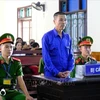Hanoi (VNA) – Free meals have been delivered to the needy in Hanoi as part of a programme launched by the Vietnam Volunteer Centre under the Ho Chi Minh Communist Youth Union (HCYU) Central Committee, the Vietnam Youth Federation of Hanoi, artists and donors in the city.
The programme aims to support people facing difficulties in the city where strict social distancing measures are being applied as part of efforts to prevent the spreading of the COVID-19 pandemic.
On the first day of launching on July 24, 200 meals were delivered to poor patients in Le Thanh Nghi street in Hai Ba Trung district, where patients suffering kidney diseases gather.
On July 25 night, additional 300 meals and 200 loafs of bread were given to poor patients, workers and students in many areas across the city.
According to the organising board, the programme will make about 1,000 meals each day with the careful implementation of food safety regulations. The meals will be delivered with the support of the Pickup Vietnam Club.
The Vietnam Youth Federation of Hanoi has called for support from donors to the programme in any form, thus contributing to assisting people in Hanoi to overcome the pandemic.
The capital city has been applying strict social distancing measures from 6am on July 24 to prevent further spread of the COVID-19 pandemic.
Under the new measures, all public transport services including buses, taxis, contract vehicles and coaches are banned, excluding those in service of pandemic prevention and control and transporting workers and experts. Motorbikes are also suspended from transporting passengers.
People in the city are asked to stay at home and only go outside in necessary cases like business trips, working at essential businesses (State agencies, factories, essential shops and service providers), buy food and medicines, or emergencies such as medical issues, fires or natural disasters.
Adverse impacts from the pandemic have caused many difficulties, especially vulnerable groups such as poor patients, workers, and students./.
The programme aims to support people facing difficulties in the city where strict social distancing measures are being applied as part of efforts to prevent the spreading of the COVID-19 pandemic.
On the first day of launching on July 24, 200 meals were delivered to poor patients in Le Thanh Nghi street in Hai Ba Trung district, where patients suffering kidney diseases gather.
On July 25 night, additional 300 meals and 200 loafs of bread were given to poor patients, workers and students in many areas across the city.
According to the organising board, the programme will make about 1,000 meals each day with the careful implementation of food safety regulations. The meals will be delivered with the support of the Pickup Vietnam Club.
The Vietnam Youth Federation of Hanoi has called for support from donors to the programme in any form, thus contributing to assisting people in Hanoi to overcome the pandemic.
The capital city has been applying strict social distancing measures from 6am on July 24 to prevent further spread of the COVID-19 pandemic.
Under the new measures, all public transport services including buses, taxis, contract vehicles and coaches are banned, excluding those in service of pandemic prevention and control and transporting workers and experts. Motorbikes are also suspended from transporting passengers.
People in the city are asked to stay at home and only go outside in necessary cases like business trips, working at essential businesses (State agencies, factories, essential shops and service providers), buy food and medicines, or emergencies such as medical issues, fires or natural disasters.
Adverse impacts from the pandemic have caused many difficulties, especially vulnerable groups such as poor patients, workers, and students./.
VNA

